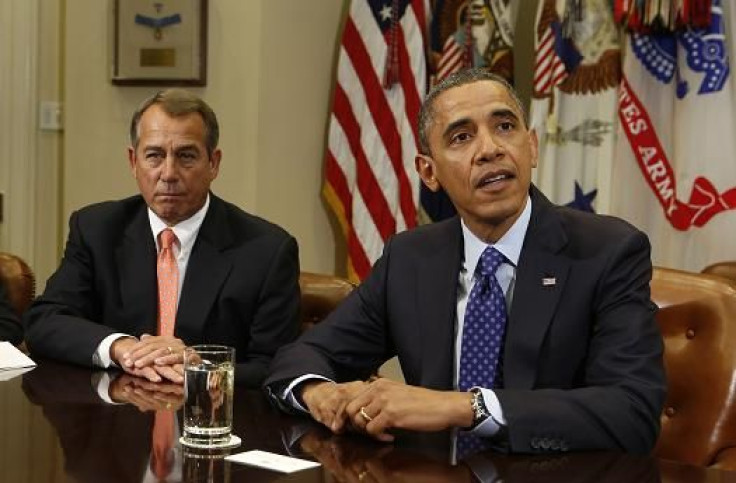House To Vote On Boehner's Plan B; Obama Urges GOP To Take Fiscal Cliff Deal

House Republicans will move to vote Thursday on Speaker John Boehner’s version of a fiscal cliff agreement, which he refers to as “Plan B,” even as President Barack Obama threatens to veto it for coming up short. The so-called fiscal cliff is a series of automatic tax increases and deep federal spending cuts that will kick in next month if no agreement is reached before Dec. 31.
Boehner has been working to gain support for his plan, which would preserve tax breaks for households with annual incomes between $250,000 and $1 million. The vote is expected by early evening.
Under “Plan B,” there would be a tax hike for households with annual incomes over $1 million. The bill represents the Republicans' concession toward Democrats as it softens their stance on their no new taxes pledge. It might also have come about after Boehner may have realized that such an increase won’t hurt millionaires or harm jobs.
Grover Norquist's Americans for Tax Reform, or ATR, an anti-tax group, issued a statement Wednesday, not endorsing Boehner's plan, but stating that a vote for it wouldn't be considered a violation of its longstanding Taxpayer Protect Pledge. More than two decades ago, Republicans committed to the pledge to oppose all tax increases.
"Republicans supporting this bill are this week affirming to their constituents in writing that this bill -- the sole purpose for which is to prevent tax increases -- is consistent with the pledge they made to them," the statement read. "In ATR's analysis, it is extremely difficult -- if not impossible -- to fault these Republicans' assertion."
And after a blog post seemingly supporting "Plan B" on Wednesday, tea party-aligned FreedomWorks later openly voiced opposition Thursday and urged the House to vote no.
In a letter sent to Congress, Matt Kibbe, president and CEO of the grassroots organization, wrote that "the cause of fiscal conservatism could be set back by the House passing this legislation in the current environment. This is not the time to be negotiating about how much automatic tax hikes should be. Raising taxes is not the way to get America out of our fiscal mess. Washington has an over-spending problem, not an under-taxing problem."
The solution, Kibbe wrote, lies in fixing the tax code and reforming spending and entitlements.
"Only by making these real, substantial reforms will we be able to get our fiscal house in order and avoid another damaging debt downgrade," his letter read. "FreedomWorks has been urging Congress to keep its promise of $1.2 trillion in ten-year sequester savings, extend all current tax rates for one year, and reform taxes and entitlements."
Things looked as if they were moving in the right direction earlier this week. Obama upped his tax increase threshold from $250,000 to $400,000 annually per household.
However, on Wednesday, the fiscal cliff negotiations appeared to have broken down again, with both sides holding separate press conferences.
They are both looking for a plan that could pass in the House. But Obama believes Republicans are having a hard time agreeing with him.
“At some point, there’s got to be, I think, a recognition on the part of my Republican friends that -- take the deal,” Obama said in a press conference. “They will be able to claim that they have worked with me over the last two years to reduce the deficit more than any other deficit reduction package; that we will have stabilized it for 10 years. That is a significant achievement for them. They should be proud of it. But they keep on finding ways to say no, as opposed to finding ways to say yes.
“And I don’t know how much of that just has to do with -- it is very hard for them to say yes to me,” Obama added. “But at some point, they’ve got to take me out of it and think about their voters, and think about what’s best for the country.”
Boehner, on the other hand, said the White House has yet to achieve balance in its plan. He is hoping for a “broader agreement” that will reduce spending while the issue of revenue is still being discussed.
“What we’ve offered meets the definition of balance, but the president is not there yet,” Boehner said a press conference. “The White House offer yesterday was essentially $1.3 trillion in new revenues for only $850 billion in net spending reductions. That’s not balanced in my opinion.”
According to The Hill, nine House Republicans have said they are either leaning against or definitely opposing the Boehner bill. Others are reportedly undecided.
The paper also reported that "a senior GOP lawmaker close to the leadership [said] Boehner would likely hold a vote on the measure regardless of whether he believes it will pass or fail, to show President Obama that Republicans won’t vote for an option without significant spending cuts."
Boehner has said he is moving forward with his “Plan B” so as to “protect as many American taxpayers as we can.”
“At this point, having a backup plan that makes sure that as few American taxpayers are affected by this increase as possible -- moving down that path is the right course of action for us,” he said before leaving the podium.
What Boehner essentially did was to try to frame Obama and the Democrats' decision as either being in agreement with the House’s plan or taking responsibility “for the largest tax increase in American history.”
Whether Americans will view Obama as responsible for any tax increase at the end of this year is yet to be seen. Boehner is in fact leading a House that has been truly unpopular recently, and the Republican Party isn’t in much better standing at this point.
© Copyright IBTimes 2024. All rights reserved.












